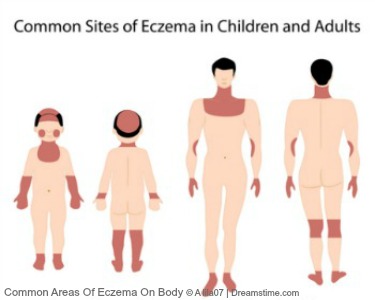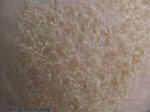Find Different Ways To Manage Your Eczema On Body Parts
As an eczema sufferer, you are likely to have eczema on body parts all over.
Different areas can be affected by different types of eczema.

Different areas can also have various causes and triggers.
Some parts of the body are more sensitive than others.
You may need to take more care when treating and managing your eczema on these areas.
Eczema On Body Parts
Some of the more common areas where eczema can occur are
- Hands. They are in constant contact with the environment, and many different allergens and irritants. This can cause a flare up to occur frequently, and make it tricky to treat. Proper management can help to reduce outbreaks, and further damage to the skin
- Face. There are some sensitive areas on your face. These will need a kinder treatment to avoid damaging the skin. Find the best ways to treat and manage the different areas on your face
- Scalp. Eczema on your scalp can be triggered by products you use. The skin becomes dry, flaky and itchy. It can appear as dandruff. One type of eczema commonly found on the scalp is Seborrheic Dermatitis. On infants it is known as Cradle Cap
- Feet. Eczema on the feet can be painful. You can spend a lot of your day on your feet. Also you tend to have them covered. Learn how to limit the rubbing of socks and shoes on your skin, and how to treat eczema on your feet without too much disruption to your life
- Penis. Also known as Penile Dermatitis. It can be very irritating and sore. As it is a sensitive part of the body, the treatments you use need to be gentle and kind to your skin. You need to avoid added irritation
- Vagina. The itchiness of vaginal eczema can be irritating and inconvenient. Again it is important to manage your eczema on this sensitive area. Preventing it before you get a flare up can make a huge difference
Certain types of eczema affect certain parts of the body
- Dyshidrotic Eczema. Mainly affects the hands
- Seborrheic Dermatitis. Mainly the scalp and face
- Stasis Dermatitis. Found on the legs
Other types can be found on any body part
You can find out more about each one. And how to treat and manage the different areas of the body affected by eczema.
Return from Eczema On Body to What Is Eczema
Search What Is Eczema?
Advertising on What Is Eczema?
We are a participant in the Amazon Services LLC Associates Program, an affiliate program which allows sites to earn fees by advertising and linking to amazon.com. If you make a purchase through a link on this page, I may receive a small commission, at no extra cost to you. Many thanks
